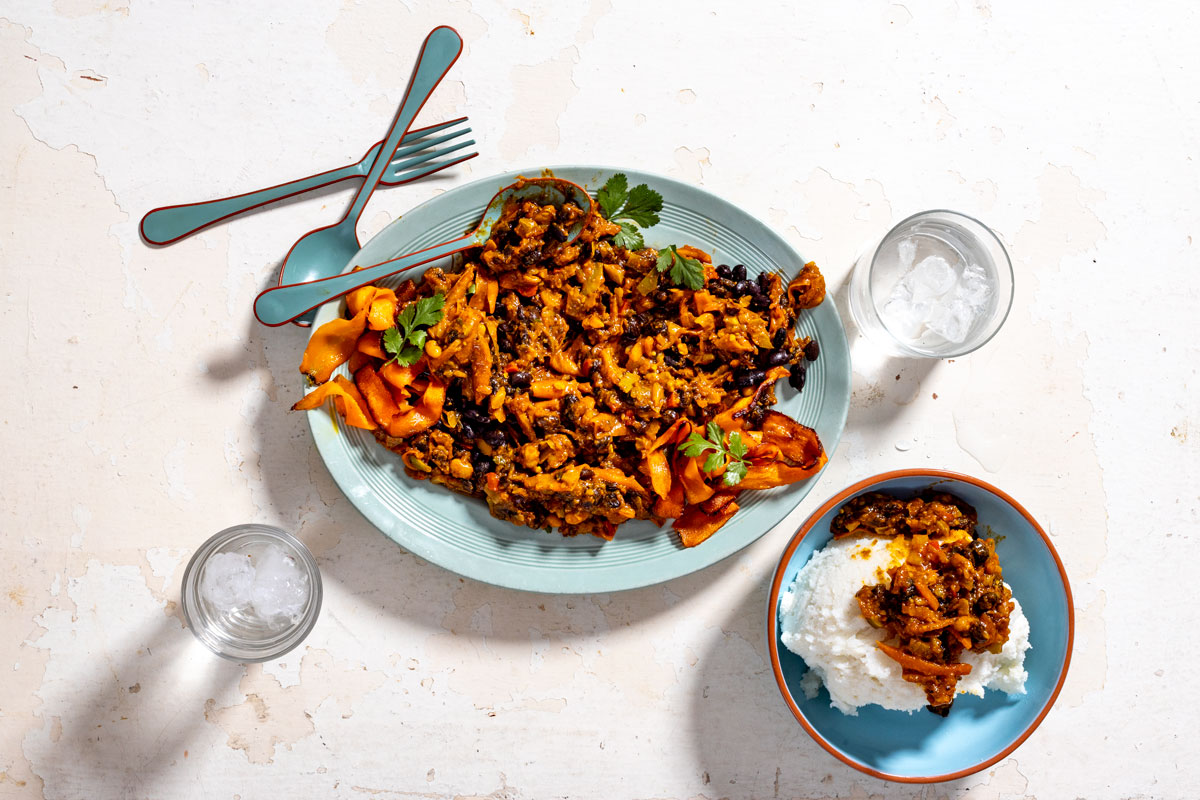The Heritage Series: Meet Ofentse Clive Ndou of Chef Ndou
Private chef and caterer Ofentse Clive Ndou seemingly effortlessly blends the traditional with the contemporary in his food – and in great style, too. His cooking is suffused with creativity, meticulous attention to detail and a palpable love for all he does.
Private chef and caterer Ofentse Clive Ndou seemingly effortlessly blends the traditional with the contemporary in his food – and in great style, too. His cooking is suffused with creativity, meticulous attention to detail and a palpable love for all he does.
Featuring a special blend of beauty, the spirit of sharing and enormous flavour, the food created by private chef and caterer Ofentse Clive Ndou is both delicious and unforgettable. He established his catering company Chef Ndou in 2019, cooking for a bevy of high-profile clients who would eventually become friends as a result of the bonds his cooking would inevitably forge. While his playfulness and curiosity ensure that nothing he makes or does could ever be boring, it’s Ofentse’s capacity to learn – and in turn, to teach other young chefs – that has made him a vital and empowering food voice.

Find the recipe for Ofentse's Black bean chakalaka here.
Ofentse attended the Capital Hotel School in Pretoria, obtaining a diploma in culinary arts, where he stood out among his fellow students as passionate not only about food, but about how it makes people feel. He pays heartfelt tribute to his Venda heritage in his cooking, often incorporating local dishes like morogo and stewed mopani caterpillars among those featured in elaborate spreads of a range of cuisines, challenging perceptions of which foods belong where.
And as locally inclined as he may be, Ofentse doesn’t abide by borders; his food influences combine African and Mediterranean epicurean traditions. He’s renowned for creating clean, simple yet generous flavours, for allowing ingredients to “speak for themselves”, and for producing dishes designed to be joyfully passed around a table.
Ofentse’s main offering is family-style food spreads, and his table commonly features piles of fire-roasted peri-peri prawns; fresh, inventive salads; and platters of indigenous grains and vegetables. He can most often be found hosting long, lavish lunches and dinners in venues around Gauteng, or catering at private residences.
View this post on Instagram
What does Heritage Day mean to you?
Heritage Day signifies a celebration of the diversity of our traditions, cultures and histories, and of connecting to our roots and cultural identities – and it absolutely does influence my approach to cooking. I love to prepare a family-style menu, and to infuse that menu with traditional South African food, because it creates a sense of nostalgia for the group and the environment. I love to see people’s faces light up at the sight of food that they’ve longed for.
Which foods evoke the strongest sense of nostalgia and memory for you?
Mogodu and ting ya mabele with morogo. This dish is so easy to cook, but you must be patient with it. Mogodu takes time to develop flavour, and with ting the fermentation process is so exciting. I’m always curious as to how our forefathers created this process. I love the smell of ting! The memories this dish brings are of traditional celebrations, when family and friends gather around the fire at night in preparation for a celebration that’s happening the following day.
Can you share a particular dish that connects you to your heritage, and explain its significance in your culinary practice?
I’m from Mamelodi, Pretoria, and there is a well-known sandwich from the area called a spatlo: it’s bread filled with a mix of atchar, chips, polony and cheese. Every time I eat a spatlo I find comfort in it, and it makes me happy. I want my food to bring the same kind of feeling of comfort to people – the same kind of nostalgic feeling of being home, no matter where the taste experience takes place.
View this post on Instagram
In your cooking, how do you balance preserving traditional recipes with incorporating modern techniques?
I always cook traditional meals as authentically as possible; this way, I keep to the traditional methods of preparing the food, doing things the same as they have always been done. Even when I’m incorporating modern techniques, a dish must not lose its classic flavour – although food can be plated with a modern touch.
How can food help celebrate and preserve heritage, and how do you see yourself contributing to this effort?
Using traditional ingredients and cooking techniques preserves cultural knowledge and skills, and sharing traditional meals strengthens bonds and cultural ties. My role as a chef is to educate, and to keep on cooking and sharing traditional food with the world.
Follow Clive Ndouon @chefndou on Instagram.



Comments